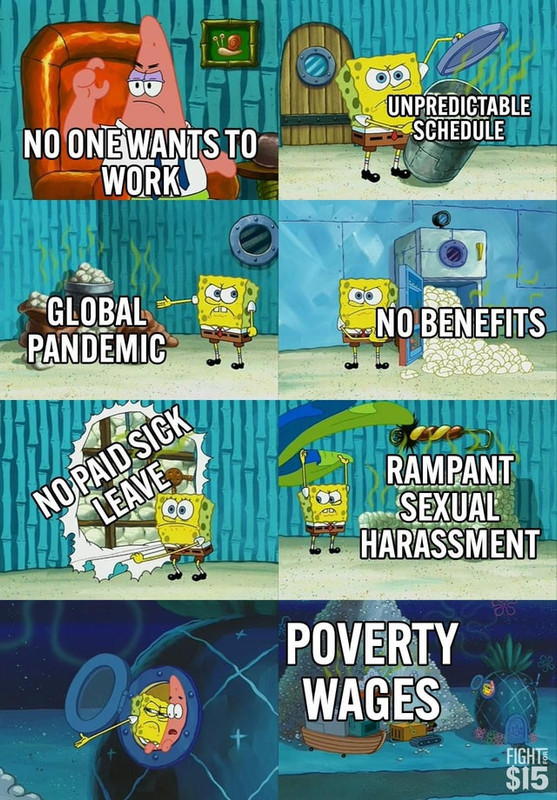Welcome to Debate Club! Please be aware that this is a space for respectful debate, and that your ideas will be challenged here. Please remember to critique the argument, not the author.
What determines how your life will be?
Options
Replies
-
Theoldguy1 wrote: »Haven't seen work ethic mentioned.
Work ethic is a belief that work and diligence have a moral benefit and an inherent ability, virtue or value to strengthen character and individual abilities.[1] It is a set of values centered on importance of work and manifested by determination or desire to work hard. Social ingrainment of this value is considered to enhance character through hard work that is respective to an individual's field of work
https://en.wikipedia.org/wiki/Work_ethic
Note, it's my belief that strong work ethic transfers over to good in one's personal life.
"Strong work ethic" has become corporate-speak for "available to my employer 24 hours a day, 7 days a week".
I'm not saying the phrase always had that connotation, but it definitely does now. If you don't answer an e-mail on a Sunday morning, you are accused of not having a "strong work ethic".7 -
It's interesting (and a little odd to me) that the discussion of "work ethic" here seems to be framing it as something inherently about paid labor. I understand that the linked Wikipedia article, and some other definition sources, frame it that way.
But that's not the way I think of it. To me, it's more a shorthand for a set of behaviors, or perhaps a character trait. (Some other sources' definitions seem to frame it this way, too.) I don't know quite how to define it, but it seems like bringing one's whole self, intelligence, and energy to an important task at hand, during the time devoted to that task.
I don't agree with the post that set off this sub-thread, that it's merely that "strong work ethic transfers over to good in one's personal life". I think it potentially applies across multiple domains in life (but not necessarily to all domains equally).
I'll give an example from my own background, that I think represents strong work ethic: My dad built the house I grew up in, in less than a year, mostly just helped by his brother, and a bit by my pregnant mother (though she had fewer relevant skills). Cousins came to help with specific tasks, like raising walls or laying cement, that require a crew, but mostly it was just dad & uncle coming home from paid work every bleepin' day - and on their vacations from paid work - and working until bedtime. Only a few specialty things, like putting in the furnace, plastering, and drilling the well, were hired out. Dad/uncle did the wiring, plumbing, block-laying, carpentry, more. Decent amounts of the lumber came from cutting down trees on the property, hauling them to a nearby sawmill in small trailer-loads, then trailering back the boards. Then they turned around and did the same for my uncle's house next door. I don't see how that's not work ethic . . . but they weren't being paid.
I admit, that example's at heart an economic activity, even if not paid labor. But I think the same thing applies to other domains: I know people who are hobby artists or musicians, for example, who bring a work ethic to those things. Their work ethic distinguishes them from dippers, dabblers, and dilettantes.
In my paid-work life, I've even known some people who had a strong work ethic related to their non-paid activities, but a more slacker-like approach to their paid work, as if the paid work were a conveyor belt they hopped on at a certain of day, did the things they were explicitly told to do (not necessarily with energy), then stepped off the conveyor at clock-out time and went home. (Personally, I feel that approaching one's paid work that way increases the boredom level, makes work less enjoyable, but maybe that's just me. Yes, I have held low compensation, tedious, inherently meaningless jobs - one example was working in a extrusion-type plastics factory in the Nevada desert, making plastic flowerpots, Cool Whip bowls, mystery parts we didn't know the use of. It was still more fun to work at those jobs, during the work hours. I don't claim to have 'work ethic' across the board, though - zero work ethic for housework, for example.)2 -
Theoldguy1 wrote: »Haven't seen work ethic mentioned.
Work ethic is a belief that work and diligence have a moral benefit and an inherent ability, virtue or value to strengthen character and individual abilities.[1] It is a set of values centered on importance of work and manifested by determination or desire to work hard. Social ingrainment of this value is considered to enhance character through hard work that is respective to an individual's field of work
https://en.wikipedia.org/wiki/Work_ethic
Note, it's my belief that strong work ethic transfers over to good in one's personal life.
My attitude has always been "work smarter not harder." I quit a job once because they wanted me to hand type information from one database into another. I told them it's error prone, slow, and needlessly expensive; I can write them a query to do the entire job. They insisted it must be hand typed. I said "sorry, I'm not doing something that dumb." Constructive laziness is a big part of what separates good software developers from mediocre ones.4 -
SuzySunshine99 wrote: »Theoldguy1 wrote: »Haven't seen work ethic mentioned.
Work ethic is a belief that work and diligence have a moral benefit and an inherent ability, virtue or value to strengthen character and individual abilities.[1] It is a set of values centered on importance of work and manifested by determination or desire to work hard. Social ingrainment of this value is considered to enhance character through hard work that is respective to an individual's field of work
https://en.wikipedia.org/wiki/Work_ethic
Note, it's my belief that strong work ethic transfers over to good in one's personal life.
"Strong work ethic" has become corporate-speak for "available to my employer 24 hours a day, 7 days a week".
I'm not saying the phrase always had that connotation, but it definitely does now. If you don't answer an e-mail on a Sunday morning, you are accused of not having a "strong work ethic".
The compellation from Wikipeidia really didn't say anything about working longer.
We have had a couple neighbor teenagers start their first jobs at fast food places (they work their assigned hours and don't work "overtime") Both have gotten promotions within 2 weeks of starting. I asked them what they have done to get the promotions. Both said- Show up on time, dressed/groomed to the employer's standards
- Polite to customers and coworkers
- If they finished their assigned tasks and tasks they observe need to be done, they ask the manager what else they can do instead of going off to a corner to lean on a wall and look at their phone.
These types of behaviors will transfer over to good in one's personal life.
3 -
autobahn66 wrote: »I come from a traditional background, where work ethic is highly celebrated. I confound my value as a person so highly with my work, and with my ability and dedication to achieving my work, that it has been a detriment to my physical and mental health. It has been extremely difficult to decouple my work and my value as a person.
I can certainly relate to the bolded. Most of my self-esteem is derived from my professional accomplishments. In my role I am a very confident and competent person. Without that role, as plain old personal me, I am the same socially awkward, unconfident individual I've always been.5 -
SuzySunshine99 wrote: »Theoldguy1 wrote: »Haven't seen work ethic mentioned.
Work ethic is a belief that work and diligence have a moral benefit and an inherent ability, virtue or value to strengthen character and individual abilities.[1] It is a set of values centered on importance of work and manifested by determination or desire to work hard. Social ingrainment of this value is considered to enhance character through hard work that is respective to an individual's field of work
https://en.wikipedia.org/wiki/Work_ethic
Note, it's my belief that strong work ethic transfers over to good in one's personal life.
"Strong work ethic" has become corporate-speak for "available to my employer 24 hours a day, 7 days a week".
I'm not saying the phrase always had that connotation, but it definitely does now. If you don't answer an e-mail on a Sunday morning, you are accused of not having a "strong work ethic".
Corporate America has spent the last 30 years convincing people they're lucky to have a job. Now things have changed, and companies are lucky to have our labor. 😁3 -
 9
9 -
Subjective. I happen to think that any religion isn't needed due to the restrictions given. Nothing wrong with a little vanity. It helps you to try to improve. And jesus isn't directing me to eat right, exercise, get enough rest and improve my intellect.AshHeartsJesus wrote: »LORD JESUS is all the success i need! Everything else is vain and doesn't matter. I take great comfort in Him
A.C.E. Certified Personal and Group Fitness Trainer
IDEA Fitness member
Kickboxing Certified Instructor
Been in fitness for 30 years and have studied kinesiology and nutrition
7 -
I have not read all the replies, so I may be repeating things, but this is my opinion on success.
First off, one's childhood circumstances do not determine where you will end up, or if you can be successful.
However, it has been proven over and over, it is easier to be successful if you start out as a "have" instead of a "have not."
Now, from there your choices, your focus, your willingness to get up and "do the things," and perhaps most importantly, your ability to recognize, admit to, and correct your short comings that are holding you back will determine if you can succeed or not, regardless of where you started out.
Personal relation to the topic:
I don't consider myself "successful" - but I'm working on it. I struggle with patience - if I'm changing and doing something to get that promotion or next step, then I struggle to give it time. If I'm not seeing results from hard work, then I tend to shift focus off to something else a bit too quickly, especially if other people's responses can affect my outcome (such as getting a promotion at work). If it is something completely in my hands (such as fitness or my racing) then it's easier for me to keep my focus since I completely own the results.
Either way though, I can see how my choices have led me to where I am, and I don't blame my childhood for that - there were things about my childhood that maybe didn't set me up for success, but I still made the decisions once I was out of high school anyways - no matter how much influence my circumstances and family may have had, I still own those choices I made.
My brother on the other hand - same family, basically the same circumstances - is the polar opposite of successful, and he blames everyone but himself for where he's at in life (okay, IMO, he's what I would call a "loser" as a full grown mid-30's guy in this country). He chooses not to take responsibility, and it shows.
Our sister, the youngest in the family, took some of my advice (over 10 years between us), and took control of her choices at a younger age, ignoring a lot of the familial "advice/guilt/etc," and of all of us, is the one I would call the most successful. I still wouldn't label her "successful" but she has potential to make it there at a younger age than I do at this point.3 -
 3
3 -
 4
4 -
What a sad commentary. My grandparents' generation could buy a home and raise a family on a janitor's salary, now there is no state in the union where a full time job at minimum wage can pay for a two bedroom apartment.
 5
5 -
It's about greedy Capitalism. I'm for capitalism, but when it comes to the point where big money makers step all over the less fortunate, it sucks.NorthCascades wrote: »What a sad commentary. My grandparents' generation could buy a home and raise a family on a janitor's salary, now there is no state in the union where a full time job at minimum wage can pay for a two bedroom apartment.
A.C.E. Certified Personal and Group Fitness Trainer
IDEA Fitness member
Kickboxing Certified Instructor
Been in fitness for 30 years and have studied kinesiology and nutrition
4 -
NorthCascades wrote: »What a sad commentary. My grandparents' generation could buy a home and raise a family on a janitor's salary, now there is no state in the union where a full time job at minimum wage can pay for a two bedroom apartment.

True, but also look at what the average house in your grandparents generation looked like compared to now in regard to size, features, etc.2 -
Well my grandparents lived with us so that doesn't matter. But my dad's house (he's 88) and still lives there, was $44,000 in 1972. It appraised just recently for $548,000. Nothing done to the house except a few upgrades. Still has the 70's kitchen.Theoldguy1 wrote: »NorthCascades wrote: »What a sad commentary. My grandparents' generation could buy a home and raise a family on a janitor's salary, now there is no state in the union where a full time job at minimum wage can pay for a two bedroom apartment.
True, but also look at what the average house in your grandparents generation looked like compared to now in regard to size, features, etc.
A.C.E. Certified Personal and Group Fitness Trainer
IDEA Fitness member
Kickboxing Certified Instructor
Been in fitness for 30 years and have studied kinesiology and nutrition
5 -
Theoldguy1 wrote: »NorthCascades wrote: »What a sad commentary. My grandparents' generation could buy a home and raise a family on a janitor's salary, now there is no state in the union where a full time job at minimum wage can pay for a two bedroom apartment.

True, but also look at what the average house in your grandparents generation looked like compared to now in regard to size, features, etc.
My mom's uncle bought a house in the 1950s on a clerical worker's salary, in Stamford Connecticut. It's worth $2.7 million today. You would need a doctor's salary to buy it now. The only improvement he ever made was hanging a swing from the oak tree in the back yard. His cousin bought a house literally across the street working as an auto mechanic, it's worth $1.8 million now. 4
4 -
Well my grandparents lived with us so that doesn't matter. But my dad's house (he's 88) and still lives there, was $44,000 in 1972. It appraised just recently for $548,000. Nothing done to the house except a few upgrades. Still has the 70's kitchen.Theoldguy1 wrote: »NorthCascades wrote: »What a sad commentary. My grandparents' generation could buy a home and raise a family on a janitor's salary, now there is no state in the union where a full time job at minimum wage can pay for a two bedroom apartment.
True, but also look at what the average house in your grandparents generation looked like compared to now in regard to size, features, etc.
A.C.E. Certified Personal and Group Fitness Trainer
IDEA Fitness member
Kickboxing Certified Instructor
Been in fitness for 30 years and have studied kinesiology and nutrition
I'm guessing this is more due to location vs the actual house.1 -
NorthCascades wrote: »Theoldguy1 wrote: »NorthCascades wrote: »What a sad commentary. My grandparents' generation could buy a home and raise a family on a janitor's salary, now there is no state in the union where a full time job at minimum wage can pay for a two bedroom apartment.

True, but also look at what the average house in your grandparents generation looked like compared to now in regard to size, features, etc.
My mom's uncle bought a house in the 1950s on a clerical worker's salary, in Stamford Connecticut. It's worth $2.7 million today. You would need a doctor's salary to buy it now. The only improvement he ever made was hanging a swing from the oak tree in the back yard. His cousin bought a house literally across the street working as an auto mechanic, it's worth $1.8 million now.
Same as with @ninerbuff more location than house.1 -
Theoldguy1 wrote: »NorthCascades wrote: »What a sad commentary. My grandparents' generation could buy a home and raise a family on a janitor's salary, now there is no state in the union where a full time job at minimum wage can pay for a two bedroom apartment.

True, but also look at what the average house in your grandparents generation looked like compared to now in regard to size, features, etc.
So, respond to the meme, but but not to what NorthCascades typed with his own fingers: "now there is no state in the union where a full time job at minimum wage can pay for a two bedroom apartment."
IMU, that statement is true. A modern 2-bedroom apartment may be likely to have a few "mod cons" like appliances that didn't exist in my parents' generation**, but it's not a dramatically bigger, more luxurious place than in earlier eras.
The parents' generation may've stuffed more kids into a two-bedroom apartment because the average family was bigger, but that's not exactly the point here.
Someone working full-time at a minimum wage job had a prayer of getting by on their own with food, clothing and shelter, back in the day. Now, it's laughable, but only because one can't cry all the time.
** I switched generations vs. what NorthCascades wrote because I'm easily old enough to be his mother, maybe even his grandmother. In my early jobs, like the "machine operators, women preferred" minimum wage one at the plastics plant in the Nevada desert in the 1970s, the workers were getting by. The women machine operators (minimum wage) mostly lived with their kids (lot of divorced women who were single moms) in trailer park rentals out in the desert, and were scraping by, narrowly. The supervisors and maintenance people (mostly male), not making big bucks either, sometimes owned actual houses.3 -
Theoldguy1 wrote: »NorthCascades wrote: »Theoldguy1 wrote: »NorthCascades wrote: »What a sad commentary. My grandparents' generation could buy a home and raise a family on a janitor's salary, now there is no state in the union where a full time job at minimum wage can pay for a two bedroom apartment.

True, but also look at what the average house in your grandparents generation looked like compared to now in regard to size, features, etc.
My mom's uncle bought a house in the 1950s on a clerical worker's salary, in Stamford Connecticut. It's worth $2.7 million today. You would need a doctor's salary to buy it now. The only improvement he ever made was hanging a swing from the oak tree in the back yard. His cousin bought a house literally across the street working as an auto mechanic, it's worth $1.8 million now.
Same as with @ninerbuff more location than house.
What are you basing this opinion on?1
Categories
- All Categories
- 1.4M Health, Wellness and Goals
- 391.4K Introduce Yourself
- 43.5K Getting Started
- 259.7K Health and Weight Loss
- 175.6K Food and Nutrition
- 47.3K Recipes
- 232.3K Fitness and Exercise
- 387 Sleep, Mindfulness and Overall Wellness
- 6.4K Goal: Maintaining Weight
- 8.5K Goal: Gaining Weight and Body Building
- 152.7K Motivation and Support
- 7.8K Challenges
- 1.3K Debate Club
- 96.2K Chit-Chat
- 2.5K Fun and Games
- 3.2K MyFitnessPal Information
- 22 News and Announcements
- 916 Feature Suggestions and Ideas
- 2.3K MyFitnessPal Tech Support Questions






